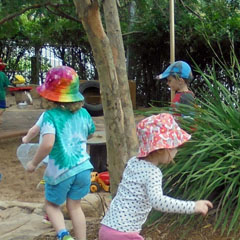In the early childhood setting, curriculum means “all the interactions, experiences, activities, routines and events, planned and unplanned, that occur in an environment designed to foster children's learning and development”
Our curriculum is play-based, child centred and emergent and is reflective of the children’s interests, strengths and needs. It is guided by the Early Years Learning Framework for Australia (EYLF), Belonging, Being, Becoming.
Opportunities to explore Indigenous perspectives, connect with nature through play, and learn about sustainability are important aspects of our curriculum. Activities that promote curiosity, discovery and imagination, problem-solving and encourage the use of the senses are central to what we do at preschool too.
While our program is constantly evolving as it is based on the children’s emerging interests and needs, there are also everyday activities that are available to the children. For example; play-dough, sand, craft, painting, drawing, puzzles, singing, construction and dramatic play. We believe that these activities offer endless opportunities for imaginative play and creativity, as well as the development of physical, cognitive, social, emotional and language skills.
In addition to core ‘everyday’ experiences, the educators extend on the children’s interests, projects and investigations in many ways. They add different materials, change and adapt the physical environment and offer questions to provoke the children’s thinking. Often the educators are co-learners, discovering alongside the children. The educators also plan intentional experiences to introduce new topics, or address issues that are relevant to the child or group.
We take great pride and care in our preschool environment, and encourage the children to develop a sense of belonging by doing the same. We see the environment as a third teacher and arrange it to provoke thinking and investigation and to support children’s independence and choice-making.
We view the outdoors and indoors as equally important and both settings are planned for. Many of these activities are embedded into our preschool culture and a part of ‘what we do’ each and every day. They are rich opportunities for integrated learning – for example, connecting with the natural world by watering the garden, feeding the worms or checking on the tadpoles.
We plan for uninterrupted periods of play so that the children can “be”, guide their own learning, make choices, develop relationships with each other and follow their own interests. The educators observe individual children and plan experiences to build upon and extend on their interests and needs.
We believe in preparing children to contribute to any community and we value and celebrate the human diversity that exists within our families, our service and our world. We intentionally plan for learning to help children and each other develop attitudes that reflect anti-bias principles.
We believe that relationships are at the heart of what we do. Respectful, trusting relationships between the children, families and the educators develop over time, so we allow lots of time during the day to listen to and get to know each other better. We value small-group interactions where each child is able to have their voice heard, but also provide opportunities for the whole class and preschool community to come together. We also value and welcome parent contributions to our program.
Our educators support the development of important social skills as the children learn how to interact and be considerate of each other. We believe that skills such as co-operation, problem solving, sharing, turn-taking, conflict resolution and negotiating are valuable. All of these become an important part of our daily experiences and are taught through planned activities and spontaneous moments that happen throughout the day. We view conflict between children as a normal part of child development and as a powerful opportunity to develop resilience and life-long social skills.


